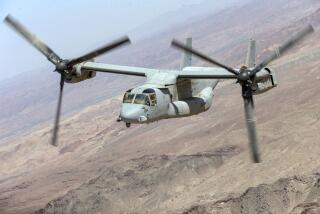British Military Plane Goes Down; Toll May Reach 15
- Share via
LONDON — Britain suffered what appeared to be its worst loss of life since the war in Iraq began 22 months ago when a Royal Air Force transport plane went down Sunday in clear weather northwest of Baghdad, leaving a trail of debris strewn over a wide area.
Military sources quoted by British newspapers and by the BBC said that at least nine British service personnel had been killed and that the death toll could reach 15.
Prime Minister Tony Blair mourned the troops’ deaths, which came on the day that millions of Iraqis defied warnings by militants and voted in their country’s first competitive election in five decades.
“This country and the world will never forget them,” Blair said, speaking at his Downing Street residence.
“Our thoughts and prayers are with the families of those who lost their lives earlier today. They can be so proud of what their loved ones accomplished,” he said.
The C-130 Hercules aircraft was on a 40-mile flight from Baghdad to Balad air base, a principal logistics distribution center for U.S. and allied forces in Iraq. The plane went down about 5:30 p.m. about 25 miles northwest of the capital, in an area where regular British troops seldom operate.
There was no immediate information on whether mechanical failure or hostile fire brought down the aircraft, considered one of the safest in military use. Military officials also declined to detail the plane’s mission.
The Daily Telegraph newspaper said the plane might have been carrying elite SAS troops on special operations and that the aircraft appeared to have been downed by insurgents.
Militants frequently fire shoulder-launched missiles at aircraft in and around Baghdad as well as in the north and west of Iraq, and a number of military helicopters have been shot down during the war, though no fixed-wing aircraft.
If the Hercules was indeed shot down, it would represent “a major success” for the insurgents, the Daily Telegraph said.
Wing Commander Nigel Arnold of the RAF base in Lyneham, about 90 miles west of London, said the air force was in the process of contacting the families of those on the flight.
He declined to give further information but pledged that there would be a thorough investigation of the crash.
Before Sunday, Britain had recorded 76 military deaths in the Iraq theater. In the worst incident, eight British Marines died in the crash of a U.S. helicopter on March 21, 2003, one of the first days of the American-led invasion to oust Saddam Hussein.
Of the deaths, 49 were from hostile fire, with the rest from accidents and other causes.
Paul Keetch, the defense spokesman for Britain’s opposition Liberal Democrats, a party that opposed the invasion of Iraq, called the loss “tragic.”
“It is doubly sad that their loss occurs on the same day as Iraq has gone to the polls. We can only wish that their sacrifice can help build a democratic Iraq,” he told reporters.
More to Read
Sign up for Essential California
The most important California stories and recommendations in your inbox every morning.
You may occasionally receive promotional content from the Los Angeles Times.











